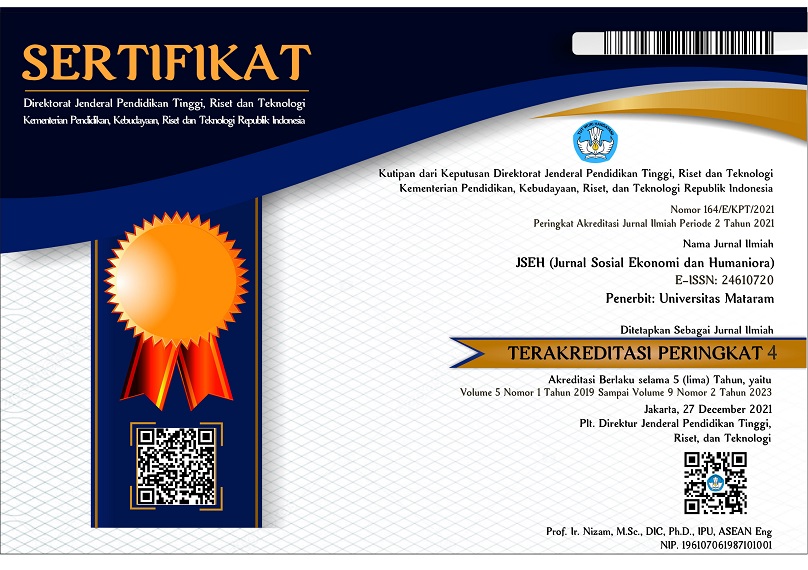Hubungan Dukungan Sosial Dengan Self-Efficacy Pada Ibu Menyusui Yang Bekerja
DOI:
https://doi.org/10.29303/jseh.v10i2.502Keywords:
Social Support, Self-Efficacy, Breastfeeding, Working MothersAbstract
Breastfeeding mothers who work face their own set of challenges during the breastfeeding process. Breastfeeding while working is not to be underestimated, especially in the absence of social support and self-efficacy among mothers. Support from coworkers emerges as one of the factors that can enhance self-efficacy among breastfeeding mothers. Such support can aid mothers in overcoming the challenges they face while breastfeeding. The aim of this research is to ascertain the relationship between social support and self-efficacy among working breastfeeding mothers. The approach employed in this research is a quantitative correlational approach with a sample size of 97 respondents. The sampling technique utilized in this research is non-probability sampling. Data analysis results indicate a correlation coefficient of r = 0.583, suggesting a positive relationship between social support and self-efficacy. This implies that higher levels of social support correspond to higher levels of self-efficacy among working breastfeeding mothers.
References
Alwisol. (2006). Psikologi kepribadian. UMM Press.
Astuti, I. (2013). Determinan Pemberian ASI Eksklusif Pada Ibu Menyusui. Jurnal Health Quality, 4(1), 1–76.
Azzahra, S. P., Azmi, K. N., Ramadhayanti, N., & Firjatullah, M. A. (2023). Self Efficacy Pada Mahasiswa Yang Mengalami Quarter Life Crisis di Universitas Bhayangkara Jakarta Raya. Parade Riset Mahasiswa, 1(1), 331–342.
Bandura, A. (1997). Self-efficacy (the Exercise of Control). W.H. Freeman and Company.
Dieterich, C. M., Felice, J. P., O’Sullivan, E., & Rasmussen, K. M. (2013). Breastfeeding and Health Outcomes for the Mother-Infant Dyad. Pediatric Clinics of North America, 60(1), 31–48. https://doi.org/10.1016/j.pcl.2012.09.010
Farida, A. F., Sulistiyani, & Nafikadini, I. (2014). Dukungan Sosial Suami dalam Pemberian ASI Eksklusif di Suku Osing. E-Jurnal Pustaka Kesehatan, 1(7).
Ferdyansyah, A., Rohaeti, E. E., & Suherman, M. M. (2020). Gambaran Self Efficacy Siswa Terhadap Pembelajaran. Fokus: Kajian Bimbingan & Konseling Dalam Pendidikan, 3(1), 16. https://doi.org/10.22460/fokus.v3i1.4214
Helfiva, S., Az-zahra, S., Halifah, E., & Fitri, A. (2023). Hubungan Dukungan Suami Dengan Breastfeeding Self Efficacy dalam Pemberian ASI di Wilayah Kerja Puskesmas Banda Raya Kota Banda Aceh. Jurnal Perawat Indonesia, 6(3), 1201–1209. https://doi.org/10.32584/jpi.v6i3.1879
Ingram, J. (2013). A Mixed Methods Evaluation of Peer Support In Bristol, UK: Mothers’, Midwives’ and Peer Supporters’ Views and the Effects On Breastfeeding. BMC Pregnancy and Childbirth, 13(1), 192. https://doi.org/10.1186/1471-2393-13-192
Jama, N. A., Wilford, A., Masango, Z., Haskins, L., Coutsoudis, A., Spies, L., & Horwood, C. (2017). Enablers and Barriers to Success Among Mothers Planning to Exclusively Breastfeed for Six Months: A Qualitative Prospective Cohort Study in KwaZulu-Natal, South Africa. International Breastfeeding Journal, 12(1), 43. https://doi.org/10.1186/s13006-017-0135-8
Rahayu, D. (2018). Hubungan Breastfeeding Self Efficacy dengan Keberhasilan Pemberian ASI Eksklusif. Jurnal Ilmu Kesehatan, 7(1), 247–252.
McCarter‐Spaulding, D. E., & Dennis, C. (2010). Psychometric Testing of the Breastfeeding Self-Efficacy Scale-Short form in A Sample of Black Women in the United States. Research in Nursing & Health, 33(2), 111–119. https://doi.org/10.1002/nur.20368
Mukhid, A. (2009). Self-Efficacy (Perspektif Teori Kognitif Sosial Dan Implikasinya Terhadap Pendidikan). Tadris: Jurnal Pendidikan Islam, 4(1), 106–122.
Novitasari, E., & Khasanah, R. N. (2022). Peran dan Tanggung Jawab Ibu Menyusui dalam Menghadapi Kesetaraan Gender Untuk Bekerja. Formosa Journal of Applied Sciences, 1(3), 249–262. https://doi.org/10.55927/fjas.v1i3.1016
Permatasari, T. A. E., & Sudiarti, N. W. (2020). Do Health Workers Play a Role in Exclusive Breastfeeding Among Working Mothers in Industrial Area? Journal of Nutritional Science and Vitaminology, 66(1), S94–S98. https://doi.org/10.3177/jnsv.66.S94
Pollard, D., & Guill, M. (2009). The Relationship Between Baseline Self-Efficacy and Breastfeeding Duration. Southern Online Journal of Nursing Research , 9, 1–6.
Proverawati, A., & Rahmawati, E. (2010). Kapita Selekta ASI & Menyusui. Nuha Medika.
Rahmah, L. (2006). Atribusi Tentang Kegagalan Pemberian ASI Pada Ibu Pekerja (Sebuah Studi Fenomenologi). Jurnal Psikologi Proyeksi, 6(1), 62–70.
Ratnasari, R. D. (2018). Kepercayaan Diri Ibu Pada Pemberian ASI Eksklusif di Wilayah Desa Sentolo Kulonprogo Yogyakarta [Skripsi]. Universitas ’Aisyiyah Yogyakarta.
Safitri, M. G., & Citra, A. F. (2019). Perceived Social Support dan Breastfeeding Self Efficacy Pada Ibu Menyusui ASI Eksklusif. Jurnal Psikologi, 12(2), 108–119. https://doi.org/10.35760/psi.2019.v12i2.2436
Saputri, L. H., Abeng, A. T., & Karuniawati, N. (2022). Pengaruh Sikap dan Self Efficacy terhadap Niat untuk Menyusui pada Ibu Hamil. Window of Midwifery Journal, 39–45. https://doi.org/10.33096/wom.vi.341
Sarafino, E. P. (2008). Health Psychology: Biopsychosocial Interactions . The College of New Jersey.
Siregar, M. (2017). Keterlibatan ibu Bekerja dalam Perkembangan Pendidikan Anak. Jurnal Harmoni Sosial, 11(1).
Sitorus, F. H. D. (2020). Stres Pada Ibu Bekerja. Psikologi Prima, 3(2). https://doi.org/10.34012/psychoprima.v3i2.1412
Suradi, R., Hegar, B., Partiwi, I. G. A. N., Marzuki, N. S., & Ananta, Y. (2010). Indonesia Menyusui. BP IDAI.
Syakina, D. (2021). Penerimaan Dukungan Sosial sebagai Prediktor Resiliensi Pada Tenaga Kesehatan di Masa Pandemi Covid 19. Proyeksi, 16(2), 119. https://doi.org/10.30659/jp.16.2.119-132
Tampah-Naah, A. M., Kumi-Kyereme, A., & Amo-Adjei, J. (2019). Maternal Challenges of Exclusive Breastfeeding and Complementary Feeding in Ghana. Plos One, 14(5). https://doi.org/10.1371/journal.pone.0215285
Vitasari, D., Sabrian, F., & Ernawaty, J. (2018). Hubungan Dukungan Keluarga Terhadap Efikasi Diri Ibu Menyusui dalam Memberikan ASI Eksklusif. Jurnal Online Mahasiswa (JOM) Bidang Ilmu Keperawatan, 5(2), 201–210.
Yusria. (2011). Pengaruh Dukungan Keluarga Pada Ibu dalam Meningkatkan Durasi Menyusui Sampai Dengan 6 Bulan di Kota Langsa [Tesis]. Universitas Gajah Mada.
Zimet, G. D., Dahlem, N. W., Zimet, S. G., & Farley, G. K. (1988). The Multidimensional Scale of Perceived Social Support. Journal of Personality Assessment, 52(1), 30–41. https://doi.org/10.1207/s15327752jpa5201_2.
Downloads
Published
How to Cite
Issue
Section
License
Copyright (c) 2024 Qanaya Ratih Hapsari, Dewita Karema Sarajar

This work is licensed under a Creative Commons Attribution-NonCommercial 4.0 International License.








